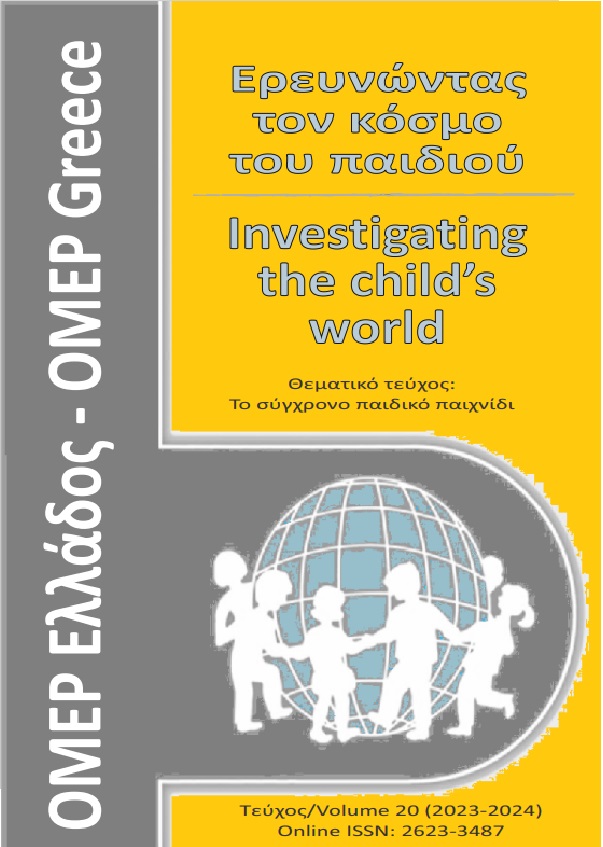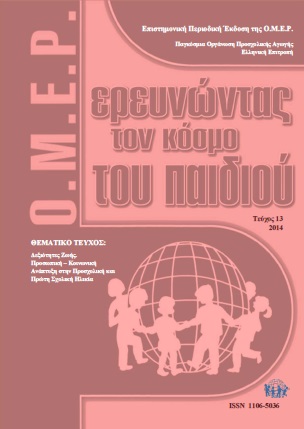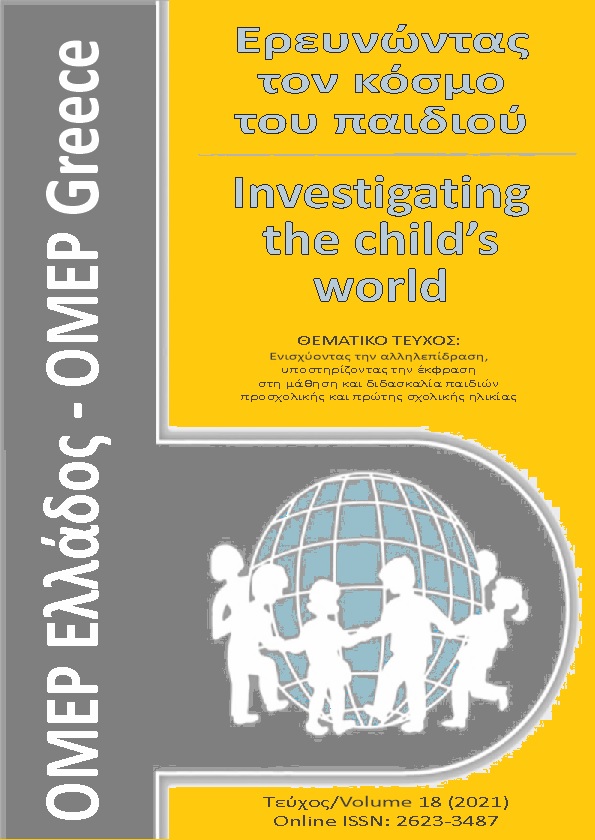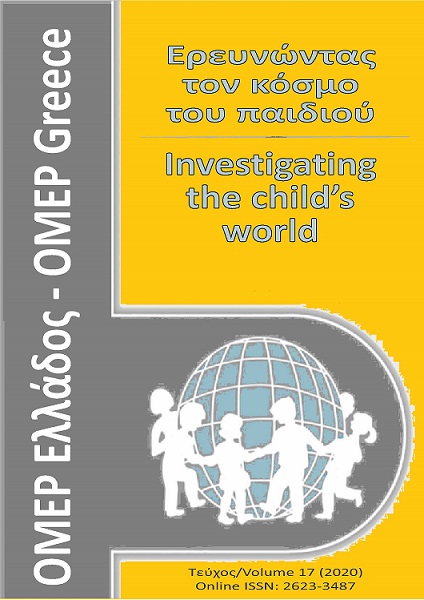Αντιλήψεις παιδιών προσχολικής ηλικίας για τη μάθηση στο πλαίσιο του παιχνιδιού

Abstract
Η σημασία του παιχνιδιού για τη μάθηση στην προσχολική ηλικία αποτελεί αντικείμενο συζήτησης διεθνώς. Η παρούσα εργασία ερευνά τις αντιλήψεις των ίδιων των παιδιών για τη σχέση μεταξύ παιχνιδιού και μάθησης. Η ιδέα αυτή στηρίζεται στις αρχές της συμμετοχικής παιδαγωγικής και έρευνας, όπου τα μικρά παιδιά αναγνωρίζονται ως ικανοί κατασκευαστές νοήματος και πληροφοριοδότες για θέματα που τα αφορούν, αναγνωρίζοντας τη σημασία των αντιλήψεων τους για τη μαθησιακή και παιδαγωγική διαδικασία. Για το σκοπό αυτό, αξιοποιούνται δεδομένα από μια μεγαλύτερου εύρους ερευνητική διαδικασία στο πλαίσιο της οποίας μελετήθηκαν οι αντιλήψεις παιδιών, γονέων και εκπαιδευτικών για διαφορετικές διαστάσεις της έννοιας μάθηση. Για τη συλλογή των δεδομένων από τα παιδιά, σχεδιάστηκε μια συμμετοχικού τύπου έρευνα, όπου αξιοποιήθηκε ένας συνδυασμός ευέλικτων ερευνητικών εργαλείων. Στην παρούσα εργασία, αναλύονται και παρουσιάζονται τα ευρήματα από τη διαδικασία της φωτο-αφήγησης, στην οποία συμμετείχαν 35 παιδιά. Η ανάλυση των δεδομένων έδειξε ότι τα παιδιά συνδέουν το παιχνίδι με τη μάθηση, αναγνωρίζοντας ότι συντελείται μάθηση στο πλαίσιο του παιχνιδιού. Το ελεύθερο παιχνίδι στο νηπιαγωγείο φάνηκε να αποτελεί για τα παιδιά αντικείμενο, αλλά και μέσο μάθησης. Επίσης, τα παιδιά φάνηκε να αναγνωρίζουν τους εαυτούς τους ως ενεργούς συμμετέχοντες στη διαδικασία της μάθησης και να συνειδητοποιούν τις διαφορετικές στρατηγικές που αξιοποιούν για να μάθουν στο πλαίσιο του παιχνιδιού. Παράλληλα, διαπιστώθηκε ότι οι συνομήλικοι αποτελούν για τα παιδιά βασικούς συντελεστές για τη μάθηση τους στο παιχνίδι, ενώ σημαντικό ρόλο, σε κάποιες περιπτώσεις, φάνηκε να έχουν οι εκπαιδευτικοί και οι γονείς.
Article Details
- Come citare
-
Κανάκη Μ., & Παπανδρέου Μ. (2024). Αντιλήψεις παιδιών προσχολικής ηλικίας για τη μάθηση στο πλαίσιο του παιχνιδιού. Ερευνώντας τον κόσμο του παιδιού, 20, 34–48. https://doi.org/10.12681/icw.35451
- Sezione
- Επιστημονική αρθρογραφία & εκπαιδευτικές δράσεις

Questo lavoro è fornito con la licenza Creative Commons Attribuzione - Non commerciale 4.0 Internazionale.
Οι Συγγραφείς που δημοσιεύουν εργασίες τους σε αυτό το περιοδικό συμφωνούν στους παρακάτω όρους:
Οι Συγγραφείς διατηρούν τα Πνευματικά Δικαιώματα και χορηγούν στο περιοδικό το δικαίωμα της πρώτης δημοσίευσης ενώ ταυτόχρονα τα πνευματικά δικαιώματα της εργασίας προστατεύονται σύμφωνα με την Creative Commons Attribution License που επιτρέπει σε τρίτους - αποδέκτες της άδειας να χρησιμοποιούν την εργασία όπως θέλουν με την προϋπόθεση της διατήρησης των διατυπώσεων που προβλέπονται στην άδεια σχετικά με την αναφορά στον αρχικό δημιουργό και την αρχική δημοσίευση σε αυτό το περιοδικό.
Οι Συγγραφείς μπορούν να συνάπτουν ξεχωριστές, και πρόσθετες συμβάσεις και συμφωνίες για την μη αποκλειστική διανομή της εργασίας όπως δημοσιεύτηκε στο περιοδικό αυτό (π.χ. κατάθεση σε ένα ακαδημαϊκό καταθετήριο ή δημοσίευση σε ένα βιβλίο), με την προϋπόθεση της αναγνώρισης και την αναφοράς της πρώτης δημοσίευσης σε αυτό το περιοδικό.
Το περιοδικό επιτρέπει και ενθαρρύνει τους Συγγραφείς να καταθέτουν τις εργασίες τους μέσω διαδικτύου (π.χ. σε ένα ακαδημαϊκό καταθετήριο ή στους προσωπικές τους ιστοσελίδες) πριν και μετά από τις διαδικασίες της δημοσίευσης, καθώς αυτό μπορεί να οδηγήσει σε παραγωγική ανταλλαγή ιδεών και σκέψεων καθώς επίσης και σε γρηγορότερη και μεγαλύτερη χρήση και ευρετηρίαση της δημοσιευμένης εργασίας (See The Effect of Open Access).





